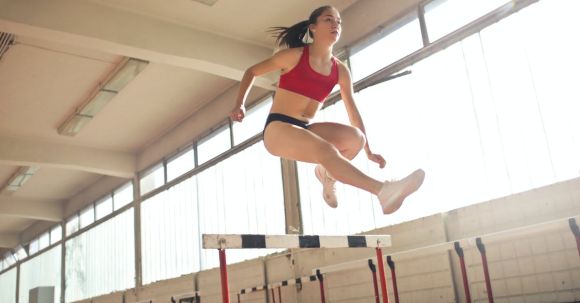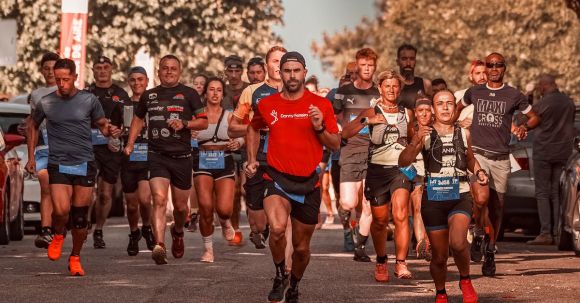When it comes to improving your performance in any sport, it is crucial to train efficiently and effectively. One of the most effective ways to do this is through sports-specific training. By tailoring your training regimen to mimic the demands of your sport, you can optimize your performance and minimize the risk of injury. In this article, we will explore the importance of sports-specific training and provide you with some tips on how to incorporate it into your routine.
Sports-specific training
In the world of sports, speed and strength are crucial factors that can make or break an athlete's performance. Whether you're a professional athlete or a weekend warrior, incorporating sports-specific exercises into your training regimen can help you take your game to the next level. These exercises are designed to target the specific muscles and movements required for your sport, helping you improve your speed, agility, and overall strength. Let's dive into some of the most effective sports-specific exercises you can incorporate into your routine.
Sprint Training for Speed
If speed is your goal, sprint training should be a key component of your workout routine. Sprinting helps to develop explosive power and improve your overall sprinting mechanics. To incorporate sprint training into your routine, find an open space or a track and perform a series of sprints at maximum effort. Start with shorter distances, such as 50 meters, and gradually increase the distance as you build your speed and endurance. To further challenge yourself, incorporate interval training by alternating between sprints and periods of active recovery.Plyometrics for Power
Plyometric exercises are a great way to enhance your power and explosiveness. These exercises involve quick, explosive movements that engage your fast-twitch muscle fibers. Examples of plyometric exercises include box jumps, depth jumps, and medicine ball throws. By incorporating plyometrics into your training routine, you can improve your vertical jump, acceleration, and overall power output.Agility Drills for Quickness
Agility is a crucial skill in many sports, requiring quick changes in direction and the ability to react to unpredictable movements. Agility drills help to improve your footwork, reaction time, and overall quickness. Cone drills, ladder drills, and shuttle runs are all effective exercises that target the specific movements required for agility. Incorporating these drills into your training routine will not only improve your ability to change direction quickly but also enhance your overall coordination and body control.Sport-specific Strength Training
To excel in your chosen sport, it's important to develop sport-specific strength. This involves targeting the muscles and movements that are most relevant to your sport. For example, basketball players may focus on exercises that improve their vertical jump and upper body strength, while soccer players may prioritize exercises that enhance their lower body strength and agility. By tailoring your strength training routine to your specific sport, you can develop the necessary strength and power required to excel on the field or court.Core Stability for Balance and Control
A strong core is essential for maintaining balance, stability, and control in sports. Core stability exercises help to strengthen the muscles in your abdomen, back, and pelvis, providing a solid foundation for athletic movements. Planks, Russian twists, and medicine ball rotations are all effective exercises that target your core muscles. By incorporating core stability exercises into your routine, you can improve your overall balance, prevent injuries, and enhance your overall athletic performance. Incorporating sports-specific exercises into your training routine is a surefire way to get faster and stronger in your chosen sport. Whether you're a sprinter, a basketball player, or a soccer enthusiast, there are exercises that can help you reach your athletic goals. By focusing on speed, power, agility, strength, and core stability, you can enhance your performance and take your game to new heights. So, lace up your sneakers, grab a ball, and get ready to unleash your full athletic potential.
Every athlete dreams of reaching their peak performance level. Whether you are a professional athlete or a recreational sports enthusiast, sports-specific training can help you achieve your goals. This type of training focuses on the specific demands of your chosen sport, helping you develop the skills, strength, and endurance needed to excel. In this article, we will explore the benefits of sports-specific training and provide some tips on how to incorporate it into your fitness routine.
Understanding the Importance of Sports-Specific Training
Sports-specific training is designed to mimic the movements, energy systems, and physical demands of your chosen sport. By tailoring your training to your specific sport, you can improve your overall performance and reduce the risk of injury. Unlike general fitness training, which focuses on developing overall strength and cardiovascular fitness, sports-specific training hones in on the specific skills and physical attributes required for your sport.Enhancing Skill Development
One of the primary benefits of sports-specific training is its ability to enhance skill development. By incorporating drills and exercises that mimic the movements and techniques used in your sport, you can improve your muscle memory, coordination, and timing. For example, if you are a tennis player, incorporating drills that focus on footwork, agility, and racket control can help you refine your skills and become a more proficient player.Improving Strength and Power
Sports-specific training also focuses on improving strength and power in the muscles used most during your sport. By incorporating exercises that target these specific muscle groups, you can develop the explosive power and strength needed to perform at your best. For example, if you are a basketball player, incorporating exercises that target your leg muscles, such as squats and lunges, can help improve your jumping ability and overall power on the court.Increasing Endurance and Stamina
Endurance and stamina are crucial for any athlete, regardless of the sport. Sports-specific training can help you develop the cardiovascular fitness needed to sustain high-intensity efforts for longer periods. By incorporating interval training, circuit training, and long-distance runs specific to your sport, you can boost your endurance and stamina, allowing you to perform at a higher level for longer periods.Incorporating Sports-Specific Training into Your Fitness Routine
Now that you understand the benefits of sports-specific training, let's explore some tips on how to incorporate it into your fitness routine. 1. Identify the specific demands of your sport: Take the time to analyze the movements, skills, and physical attributes required for your sport. This will help you tailor your training program to address these specific areas. 2. Consult with a coach or trainer: If you are unsure how to design a sports-specific training program, seek guidance from a coach or trainer. They can help you identify weaknesses and develop a plan to address them. 3. Focus on skill development: Incorporate drills and exercises that mimic the movements and techniques used in your sport. Practice these skills regularly to improve your muscle memory and coordination. 4. Include strength and power exercises: Incorporate exercises that target the muscles used most during your sport. Focus on developing explosive power and strength in these muscle groups. 5. Prioritize endurance and stamina training: Incorporate interval training, circuit training, and long-distance runs specific to your sport. Gradually increase the duration and intensity of these workouts to improve your endurance and stamina.Conclusion
Sports-specific training is a vital component of any athlete's training program. By focusing on the specific demands of your sport, you can enhance skill development, improve strength and power, and increase endurance and stamina. By incorporating these training principles into your fitness routine, you can take your performance to new heights and achieve peak athletic performance. Remember to consult with a coach or trainer to design a program tailored to your specific needs and goals.
Are you looking to improve your performance in your favorite sport? Whether you play basketball, soccer, tennis, or any other sport, incorporating sports-specific workouts into your training routine can help you increase your agility and power on the field or court. In this article, we will explore the benefits of sports-specific workouts and provide you with some effective exercises to enhance your athletic performance.
Understanding Sports-specific Workouts
Sports-specific workouts are designed to mimic the movements and demands of your chosen sport. By incorporating exercises that replicate the actions you perform during games or matches, you can develop the necessary strength, speed, and agility required to excel in your sport. These workouts target specific muscle groups and movement patterns, allowing you to optimize your performance in a controlled training environment.Benefits of Sports-specific Workouts
1. Improved agility: Agility is essential in almost every sport. Sports-specific workouts focus on quick changes in direction, lateral movements, and explosive bursts of speed. By training in a manner that mirrors the specific movements of your sport, you can enhance your agility and better navigate through the challenges presented during a game or match. 2. Increased power: Power is crucial for sports that require explosive movements, such as jumping, throwing, or sprinting. Sports-specific workouts incorporate exercises that target the muscles involved in generating power, such as the legs, hips, and core. By consistently training these muscles in a sport-specific manner, you can significantly improve your power output, allowing you to perform at a higher level.Effective Sports-specific Workouts
1. Plyometric exercises: Plyometric exercises involve explosive movements that help develop power and improve muscle responsiveness. For basketball players, exercises like box jumps and depth jumps can enhance vertical jump height. Soccer players can benefit from exercises like lateral bounds and single-leg hops to improve their agility and change of direction. 2. Sport-specific drills: Incorporating drills that simulate game-like scenarios can be highly effective in improving your performance. For tennis players, practicing quick lateral movements and split-step jumps can help improve their court coverage and reaction time. Soccer players can benefit from shuttle runs and dribbling drills that mimic their on-field movements. 3. Resistance training: Incorporating resistance training into your sports-specific workouts can help build strength and power. For example, basketball players can focus on exercises like squats, lunges, and deadlifts to improve their lower body strength and explosiveness. Tennis players can benefit from exercises like medicine ball slams and rotational cable pulls to enhance their core strength and rotational power. 4. Agility ladder drills: Agility ladder drills are great for improving footwork, coordination, and quickness. By performing ladder drills that mimic the movement patterns of your sport, you can enhance your agility and reaction time. Soccer players can benefit from ladder drills that involve quick side-to-side movements, while basketball players can focus on ladder drills that incorporate forward-backward and diagonal movements. Incorporating sports-specific workouts into your training routine can take your athletic performance to the next level. By focusing on agility, power, and sport-specific movements, you can enhance your skills and excel in your chosen sport. Remember to consult with a professional trainer or coach to ensure you are performing the exercises correctly and safely. So, lace up your shoes, grab your equipment, and get ready to elevate your game with sports-specific workouts!
Whether you're a professional athlete or a weekend warrior, incorporating sports-specific workouts into your training routine can significantly enhance your performance on the field, court, or track. These targeted exercises are designed to improve the specific skills, strength, and endurance needed for your chosen sport. By tailoring your workouts to mimic the demands of your sport, you can take your game to the next level. Here are some tips on how to fine-tune your game with sports-specific workouts.
Basketball: Elevate Your Game
To excel in basketball, you need a combination of speed, agility, power, and stamina. Incorporate exercises that focus on these areas to enhance your performance on the court. Jumping rope can improve your footwork and coordination, while lateral lunges and lateral bounds can enhance your lateral quickness and agility. To boost your vertical leap, try plyometric exercises such as box jumps and depth jumps. Additionally, including exercises that target your core and upper body strength, like planks and push-ups, can improve your ability to drive to the hoop and defend against opponents.Soccer: Amp Up Your Endurance
Soccer requires a high level of cardiovascular endurance, as well as agility and lower body strength. Interval training, such as shuttle runs and sprints, can help improve your speed and stamina on the field. Incorporate exercises that mimic the movements of soccer, such as lateral shuffles and quick direction changes, to enhance your agility and quickness. Additionally, exercises like squats and lunges can strengthen your lower body, enabling you to sprint faster and kick with more power.Tennis: Improve Your Speed and Agility
Tennis demands quick movements, explosive power, and excellent footwork. To improve your speed and agility on the court, incorporate exercises such as ladder drills, cone drills, and agility ladder exercises into your training routine. These exercises can help improve your reaction time, lateral quickness, and change of direction. Additionally, including plyometric exercises like medicine ball throws and box jumps can enhance your explosive power, enabling you to deliver powerful shots and cover the court more efficiently.Swimming: Enhance Your Stroke Technique
Swimming requires a combination of upper body strength, core stability, and efficient stroke technique. To fine-tune your swimming performance, incorporate exercises that focus on these areas. Strengthen your upper body with exercises like pull-ups, push-ups, and dumbbell rows. Plank variations can help enhance your core stability, which is crucial for maintaining proper body alignment in the water. Additionally, practicing drills that target your stroke technique, such as single-arm drills or kickboard drills, can help improve your efficiency and speed in the water.Conclusion: Elevate Your Performance
Incorporating sports-specific workouts into your training routine can give you a competitive edge in your chosen sport. By targeting the specific skills and physical demands of your sport, you can improve your performance and take your game to the next level. Whether you're a basketball player looking to enhance your vertical leap or a swimmer aiming to improve your stroke technique, tailor your workouts to meet the unique demands of your sport. With dedication and consistency, you can fine-tune your game and achieve your athletic goals. So, lace up your shoes, dive in the pool, or hit the court, and start elevating your performance today!
Sports-specific training is a crucial aspect of becoming a top athlete in any sport. It involves tailoring your training routine to focus on the specific demands and skills required in your chosen sport. By incorporating sports-specific training into your regimen, you can enhance your performance, reduce the risk of injury, and take your game to the next level. In this article, we will explore the importance of sports-specific training and provide tips on how to incorporate it into your training routine.
Understanding the Importance of Sports-Specific Training
Sports-specific training is designed to mimic the movements, skills, and physical demands of your sport. By training in a way that closely replicates the actions and requirements of your sport, you can improve your performance in a more targeted and effective manner. This type of training helps to develop the specific muscles, movement patterns, and energy systems needed to excel in your game.Benefits of Sports-Specific Training
1. Enhanced Performance: Sports-specific training allows you to focus on the skills and movements that are most important for your sport. By dedicating time to these specific areas, you can improve your technique, speed, agility, and overall performance. 2. Reduced Injury Risk: By training in a way that mimics the movements and demands of your sport, you can strengthen the muscles, tendons, and ligaments that are most susceptible to injury. This type of training also helps to improve balance and proprioception, which can further reduce the risk of injury. 3. Improved Mental Toughness: Sports-specific training often involves high-intensity drills that push you to your limits. By consistently pushing yourself in training, you can develop mental toughness and the ability to perform under pressure.Tips for Incorporating Sports-Specific Training
1. Analyze Your Sport: Take the time to analyze the specific movements, skills, and physical demands of your sport. Identify the areas where you need improvement and focus your training on those aspects. 2. Design a Targeted Training Plan: Once you have identified the areas for improvement, design a training plan that targets those specific areas. Incorporate exercises and drills that closely mimic the movements and demands of your sport. 3. Work on Sport-Specific Skills: Dedicate time to practicing the skills that are essential for your sport. Whether it's shooting, passing, dribbling, or tackling, focus on perfecting these skills through repetition and targeted drills. 4. Include Strength and Conditioning Exercises: In addition to sport-specific skills, it is important to incorporate strength and conditioning exercises into your training routine. Focus on exercises that target the muscles and energy systems used in your sport. 5. Train in Game-Like Conditions: To further enhance sports-specific training, try to replicate game-like conditions as much as possible. This could involve practicing on the same surface, using the same equipment, or simulating game situations during training. 6. Seek Professional Guidance: Consider working with a sports coach or trainer who specializes in your sport. They can provide expert guidance, personalized training plans, and valuable feedback to help you excel in your game.Conclusion: Take Your Game to the Next Level
Sports-specific training is a game-changer for athletes looking to excel in their chosen sport. By focusing on the specific skills, movements, and physical demands of your sport, you can enhance your performance, reduce the risk of injury, and reach new heights in your game. Incorporate these tips into your training routine and watch as you excel in your sport like never before.
In the world of sports, athletes are constantly seeking an edge over their competition. Whether it's speed, strength, agility, or endurance, they are always on the lookout for ways to improve their performance. One key aspect that can make a significant difference is sports-specific training. By tailoring their workouts to mimic the demands of their sport, athletes can enhance their skills and become dominant competitors. In this article, we will explore the importance of sports-specific training and provide some tips on how to incorporate it into your routine.
UNDERSTANDING SPORTS-SPECIFIC TRAINING
Sports-specific training involves designing workouts and exercises that closely resemble the movements and requirements of a specific sport. It aims to improve an athlete's overall performance by enhancing the specific skills needed for their chosen discipline. This type of training goes beyond general fitness and focuses on the specific demands of the sport, such as the techniques, energy systems, and muscle groups involved.THE BENEFITS OF SPORTS-SPECIFIC TRAINING
1. IMPROVED SKILL DEVELOPMENT: By mimicking the movements and techniques used in your sport, sports-specific training helps you develop the necessary skills more effectively. For example, if you are a tennis player, incorporating drills that focus on footwork, agility, and racket control will help you become a more skilled and dominant player on the court. 2. ENHANCED PERFORMANCE: Sports-specific training targets the muscle groups and energy systems used in your sport, leading to significant improvements in performance. For instance, a cyclist who includes hill sprints and interval training in their workouts will see a noticeable increase in their stamina and power on the bike. 3. REDUCED RISK OF INJURY: By replicating the movements and stresses that occur during your sport, sports-specific training helps to strengthen the muscles and joints used, reducing the risk of injury. For example, a basketball player who focuses on balance and stability exercises will be less prone to ankle sprains and other common basketball-related injuries.INCORPORATING SPORTS-SPECIFIC TRAINING INTO YOUR ROUTINE
1. IDENTIFY THE DEMANDS OF YOUR SPORT: Start by analyzing the specific movements, techniques, and physical requirements of your sport. This will help you understand which areas you need to focus on during your training. 2. DESIGN A TARGETED WORKOUT PLAN: Once you have identified the demands of your sport, create a workout plan that includes exercises and drills that closely mimic those movements. For example, if you are a soccer player, include exercises that improve your agility, speed, and ball control. 3. SEEK PROFESSIONAL GUIDANCE: Consider working with a sports-specific trainer or coach who can help you design a personalized training program tailored to your sport. They can provide expert guidance and ensure that you are performing the exercises correctly and safely. 4. USE SPORTS-EQUIPMENT: Incorporate sports-specific equipment into your training routine. For example, if you are a golfer, using a weighted golf club during your practice swings can help improve your swing speed and power. 5. MAINTAIN A WELL-ROUNDED APPROACH: While sports-specific training is important, it's crucial to also maintain a well-rounded approach to fitness. Include strength training, flexibility exercises, and cardiovascular workouts to ensure overall fitness and injury prevention.DOMINATE YOUR SPORT WITH SPORTS-SPECIFIC TRAINING
In conclusion, sports-specific training is a game-changer for athletes looking to dominate in their chosen sport. By tailoring your workouts to mimic the movements and demands of your sport, you can enhance your skills, improve performance, and reduce the risk of injury. So, if you are looking to take your game to the next level, incorporate sports-specific training into your routine and watch yourself become a dominant athlete in no time.
In the world of sports, athletes are constantly looking for ways to improve their performance and gain a competitive edge. While general fitness and conditioning are important, sports-specific training takes training to a whole new level. By tailoring workouts and exercises to the specific demands of your sport, you can enhance your skills, prevent injuries, and reach your full potential. In this article, we will explore the benefits of sports-specific training and provide some tips on how to incorporate it into your training routine.
Understanding Sports-Specific Training
Sports-specific training involves exercises and drills that mimic the movements and demands of your particular sport. Rather than focusing solely on general fitness, this type of training targets the specific skills, strength, and mobility required to excel in your chosen sport. Whether you are a basketball player looking to improve your shooting accuracy or a soccer player aiming to enhance your speed and agility, sports-specific training is designed to help you reach your goals.Benefits of Sports-Specific Training
1. Improved Performance: By focusing on the specific movements and skills of your sport, sports-specific training can help you improve your performance in a targeted manner. Whether it is increasing your power, speed, or accuracy, these tailored exercises can give you a competitive edge. 2. Injury Prevention: Sports-specific training not only enhances your performance but also helps prevent injuries. By strengthening the muscles and joints used in your sport and improving your technique, you can reduce the risk of common sports-related injuries. 3. Faster Skill Acquisition: Sports-specific training allows you to practice the exact movements and skills required in your sport. This targeted practice can help you acquire new skills faster and improve your overall proficiency.Tips for Incorporating Sports-Specific Training
1. Analyze Your Sport: Start by analyzing the specific movements, skills, and physical demands of your sport. Identify the key areas you want to improve and focus on exercises that target those areas. 2. Mimic Sport-Specific Movements: Incorporate exercises that closely mimic the movements and actions you perform in your sport. For example, if you are a tennis player, incorporate drills that involve quick lateral movements and explosive racquet swings. 3. Mix It Up: Vary your training routine to include a mix of sport-specific exercises and drills. This will not only keep your workouts interesting but also challenge your body in different ways, leading to better overall performance. 4. Seek Professional Guidance: If you are new to sports-specific training, consider seeking guidance from a sports coach or trainer who specializes in your sport. They can provide valuable insights, develop a tailored training program, and ensure that you are performing exercises correctly. 5. Prioritize Recovery: Sports-specific training can be intense, so it is important to prioritize recovery. Make sure to incorporate rest days into your training schedule, include flexibility exercises, and fuel your body with proper nutrition to support optimal recovery. In conclusion, sports-specific training is a valuable tool for athletes looking to boost their skills and achieve peak performance. By tailoring workouts and exercises to the specific demands of your sport, you can enhance your performance, prevent injuries, and accelerate your progress. Analyze your sport, mimic sport-specific movements, mix up your training routine, seek professional guidance, and prioritize recovery to make the most of sports-specific training. So, lace up your shoes, hit the gym or the field, and take your athletic abilities to new heights with sports-specific training.
Have you ever wondered how professional athletes achieve peak performance? It's not just their natural talent or dedication to training. One key factor that sets them apart is sports-specific training. By tailoring their workouts to mimic the demands of their sport, athletes are able to maximize their performance and reach new levels of success. In this article, we will explore the benefits of sports-specific training and provide tips on how you can incorporate it into your own fitness routine.
Understanding Sports-specific Training
Sports-specific training involves designing workouts that closely mimic the movements and energy systems required for a particular sport. This type of training focuses on improving the specific skills, strength, power, agility, and endurance needed to excel in a particular athletic endeavor. Whether you're a soccer player, a tennis player, a runner, or a swimmer, sports-specific training can help you take your performance to the next level.The Benefits
Sports-specific training offers several benefits that can help athletes excel in their chosen sport. Firstly, it helps improve skill development. By practicing sport-specific movements and techniques, athletes can enhance their coordination, balance, and proprioception, allowing them to execute their skills with greater precision and efficiency. Secondly, sports-specific training improves strength and power. By targeting the muscles and energy systems used in a particular sport, athletes can develop the explosive power and strength needed to outperform their opponents. For example, a basketball player may focus on exercises that improve their vertical jump, while a cyclist may prioritize leg strength and endurance. Thirdly, sports-specific training enhances agility and speed. By incorporating drills and exercises that improve agility, athletes can become more nimble and responsive on the field or court. This can give them a competitive edge by allowing them to change direction quickly, dodge opponents, and react faster to game situations. Lastly, sports-specific training improves overall conditioning and endurance. By structuring workouts to match the intensity and duration of a particular sport, athletes can improve their cardiovascular fitness and stamina. This is crucial for sports that involve prolonged periods of physical exertion, such as long-distance running or cycling.Incorporating Sports-specific Training into Your Routine
To incorporate sports-specific training into your fitness routine, start by analyzing the demands of your sport. Identify the key skills, movements, and energy systems required and design your workouts accordingly. Consider incorporating the following strategies: 1. Specific exercises: Choose exercises that closely mimic the movements used in your sport. For example, if you're a tennis player, incorporate exercises that target your shoulder, core, and lower body strength. 2. Interval training: Include intervals of high-intensity exercises that replicate the bursts of effort required in your sport. For instance, a soccer player may perform sprint intervals to improve their speed and endurance. 3. Sport-specific drills: Incorporate drills that simulate game situations and challenge your skills. This could involve practicing dribbling and shooting for basketball players or practicing serve and volley for tennis players. 4. Cross-training: Supplement your sports-specific training with exercises that target different muscle groups and energy systems. This can help prevent overuse injuries and improve overall fitness. In conclusion, sports-specific training is a game-changer for athletes looking to enhance their performance. By tailoring workouts to match the demands of their sport, athletes can improve their skills, strength, power, agility, and endurance. Whether you're a recreational athlete or aspiring professional, incorporating sports-specific training into your routine can help unleash your inner athlete and take your performance to new heights. So, lace up your shoes, grab your racket, or jump in the pool, and start training like a true champion.
In the world of sports, athletes are constantly striving to gain an edge over their competition. One of the most effective ways to do this is through sports-specific training. By tailoring their workouts to the demands of their specific sport, athletes can enhance their performance and take their game to the next level. In this article, we will explore the benefits of sports-specific training and provide some practical tips on how to incorporate it into your own training regimen.









